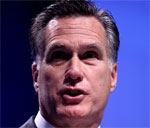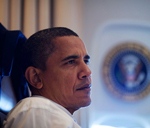As the U.S. presidential campaign intensifies ahead of the general election on November 6, 2012, AQ Online provides continuous updates of candidates’ positions on issues that are critical to U.S. relations with the Americas.
Check back here as the Republican candidate Mitt Romney’s Americas-focused policies—as well as related developments from the Obama presidency—unfold. We will post the latest statements on issues such as hemispheric cooperation, security, trade, immigration, and more.
MITT ROMNEY (REPUBLICAN)
FORMER GOVERNOR OF MASSACHUSETTS, 2012 PRESUMPTIVE NOMINEE
 Photo: Gage Skidmore |
Governor Romney announced a cadre of foreign policy advisors acting as a “shadow cabinet” last October. His Latin America team has two co-chairs: Ray Walser, senior policy analyst at the Heritage Foundation; and Clifford Sobel, U.S. ambassador to Brazil from 2006 to 2009.
Hemispheric Relations: In an October 2011 article in POLITICO, an aide to Romney said that “neither the [George W.] Bush administration or the Obama administration really focused on Latin America”—and added that Romney envisions “larger campaigns for economic opportunity in Latin America.” The Latin America issues page on Romney’s website says that he, in the first 100 days of his presidency, will launch a “public diplomacy and trade promotion effort” called the Campaign for Economic Opportunity in the region.
Bolivarianism: In October, Romney released a white paper, “An American Century: A Strategy to Secure America’s Enduring Interests and Ideals,” where he writes: “Venezuela and Cuba are leading a virulently anti-American ‘Bolivarian’ movement across Latin America that seeks to undermine institutions of democratic governance and economic opportunity.” He said one month later that “Hezbollah, which is working throughout Latin America, in Venezuela, in Mexico, throughout Latin America, which poses a very significant and imminent threat to the United States of America.”
Immigration: Romney believes that legislation which encourages a pathway to citizenship for undocumented migrants is “amnesty,” and referred to it in a November debate as “a magnet.” Romney supports legal immigration and the granting of green cards to any graduate of a math, science or engineering degree from a U.S. institution. He has supported controversial legislation at the state level, such as Arizona’s SB1070, and disagrees with any U.S. Justice Department effort to block the legislation from taking effect. Romney also favors completing the border fence, adding more border patrol agents, and ensuring the U.S. has an “E-Verify system and require employers to check the documents of workers.”
Counternarcotics: Governor Romney’s Latin America issues page promises to “build on separate existing anti-drug and counterterrorism initiatives to form a unified Hemispheric Joint Task Force on Crime and Terrorism.” The purpose of this task force would be one of intelligence sharing and law enforcement. The same page endorses building on the Mérida Initiative in the interest of “enhanced military-to-military cooperation and intelligence sharing” similar to Plan Colombia.
Cuba: In a January debate in Florida, Romney reiterated his support for the Helms-Burton Act and promised “to use every resource we have, short of invasion and military action, to make sure that when Fidel Castro finally leaves this planet, that we are able to help the people of Cuba enjoy freedom.”
BARACK OBAMA (DEMOCRAT)
FORTY-FOURTH PRESIDENT OF THE UNITED STATES OF AMERICA
 Photo: White House |
2008: In the 2008 general election, Latinos voted for the President by a more than two-to-one margin over Arizona Senator John McCain (67 percent to 31 percent). A March 2012 poll by Fox News Latino shows that 73 percent of likely Latino voters approve of the president’s overall performance in office. The same survey indicates that, when matched one-on-one with any GOP opponent, Obama wins the Hispanic vote by double digits, and that four of five Latinos who voted for Obama in 2008 would re-elect him.
Trade: In October 2011, President Obama signed into law free-trade agreements with Colombia, Panama and South Korea. This came after a series of deals with lawmakers questioning various provisions of each agreement. In a statement, the President said: “If we do not seize the opportunity to lead, others will, and the accompanying economic benefits will accrue to their nations rather than ours.”
Hemispheric Relations: In 2009, Obama attended the Fifth Summit of the Americas in Port of Spain, Trinidad and Tobago, where he pledged for a renewed era of “equal partnership.” Before flying to the Summit, Obama was in Mexico meeting with President Felipe Calderón to discuss a range of bilateral issues, such as counternarcotics measures, the arms trade, immigration, and the economy. In March 2011, Obama made his first official visit to Central and South America—traveling to Brazil, Chile and El Salvador to reinforce commercial and strategic linkages with the region. In April 2012, he will travel to Cartagena, Colombia for the Sixth Summit of the Americas.
Cuba: Shortly after assuming office, Obama began easing travel restrictions to Cuba—from three times per year under Obama’s predecessor to an unlimited number of visits. Obama also permitted Cuban-Americans to visit their relatives on the island as often as possible. In April 2011, the Treasury Department’s Office of Financial Assets Control (OFAC) allowed religious organizations and educational institutions to apply for an OFAC license to travel to Cuba. But like his many predecessors since Cuba’s 1959 revolution, Obama favors maintaining the embargo as well as preventing Cuba from rejoining the Organization of American States.
Immigration: Despite Obama’s support for legislation such as the DREAM Act, no such bill has arrived on his desk. The DREAM Act failed in the Senate in December 2010, mere weeks before a Republican-controlled House of Representatives went into effect. In August 2011, the Obama administration announced that undocumented students and other low-priority immigration offenders would not be targeted for deportation. However, a report late last year from the U.S. Immigration and Customs Enforcement branch of the Department of Homeland Security showed that Fiscal Year 2011 was a record year for deportations, amounting to nearly 397,000 individuals.

